- Home
- Mark Zubro
Dying to Play Page 12
Dying to Play Read online
Page 12
“Could someone have given him some of your stuff and mixed it with something else and come up with a lethal combination?”
“I don’t see how.”
Which wasn’t a definitive no.
If he knew more, he wasn’t about to tell.
WEDNESDAY 12:15 P.M.
As we drove back, Murray said, “I just take them sometimes.”
“What you take is your business, not mine.”
Murray wanted to get to the police station. He wanted to see if there were any official statements or a press conference.
After I left him, I paid a visit to the hospital to see how the officers from last night were doing.
They were in beds in the same room. Manny Glinga was loudly complaining to a nurse, doctor, and a uniformed police officer about the treatment. “I’m in pain. Nobody will give me drugs.”
The nurse murmured assurances. The doctor looked annoyed. The cop yawned. Glinga said, “Things better get better pretty quick.”
They noticed me. “Who the hell are you?” Glinga demanded.
The uniformed officer said, “He’s the guy who saved your life.”
Glinga squinted at me. “Oh, yeah, I sort of remember. Thanks, I guess.”
I moved farther into the room. Raul Sanchez was hooked up to several machines. He seemed to be asleep. “How’s your partner?” I asked.
“He’s going to be okay,” Glinga said. “Excuse me, I gotta talk to these people.”
I tuned him out and approached Raul. The machines gave off low murmurs. One beeped at regular intervals. His chest rose and fell. I touched his hand. He gripped mine. His eyes opened for a second then shut. He muttered something I couldn’t hear. I leaned closer. His eyes opened again for an instant then closed. He breathed hard for several more moments then whispered, “Be careful. Be careful.” His eyes closed and his breathing returned to normal.
I turned to the others who didn’t seem to have noticed. A technician came in and began to check the readings on the machines. “Is he going to be okay?”
“Are you a member of the family?”
“I saved his life.”
“Oh. Well, I guess.” He confirmed what Glinga had just said but added, “It will be a while.”
I left a few minutes later. Glinga hadn’t shut up the entire time I was in the room. I wondered what Raul had been warning me to be careful of.
I decided to give the entourage’s enclave a better look. On my way I passed the police department. The parking lot was filled with cars and a herd of media trucks. The frenzy must be intense.
A Porsche, a Jaguar, and a Mercedes were parked on the street outside of the vast Victorian mausoleum the entourage occupied. I found a spot for my out-of-place Escort under a gorgeous old elm spreading its vast canopy of leaves to shade the street. I was between the silver Mercedes and the maroon Jaguar. I hoped the Escort didn’t suffer from low self-esteem.
I strode to the front door. Through the window to the left of the front door I saw the three men I’d seen yesterday. In the kitchen were Bordine, the skinny guy, in black cargo shorts and no shirt, Meyers in a flowered shirt and sweatpants, and Krunst in a suit and tie.
I knocked.
Meyers answered the door. “No reporters, go away.” Today’s shirt had pink and yellow flowers.
I said, “I’m not a reporter. I’m a private investigator, Mike King.”
“I want you to go even more away.” He slammed the door.
I rang and knocked and banged and knocked and rang until he returned. “Get the fuck out of here,” he said.
I said, “Tim Czobel is dead.”
Krunst and Bordine came up behind him. Krunst said, “Get the fuck rid of him.” He peered over Meyers’s shoulder.
I repeated my news.
Ash colored visages spread on all their faces.
“Who are you?” Krunst asked.
“Mike King, a private investigator.”
“Let him in.”
We stood into the front hall, blessedly air-conditioned.
Meyers asked, “What do you mean Czobel’s dead? Nobody’s said anything to us. No reporters have called with the news. The police haven’t been here.”
I said, “You’d think at least a few of the reporters would be camped out here.”
Krunst said, “The police have a press conference scheduled in half an hour. We’re supposed to be there. They’re going to officially announce that Tyler was murdered.”
Meyers asked, “How do you know Czobel was murdered?”
I turned to Krunst. “Any particular reason you were chasing him down Main Street early this morning with a broken beer bottle?”
“It wasn’t me,” Krunst said.
I get really annoyed when they tell such blatant lies.
I said, “I stood between you and him. I watched you turn and run.”
“I didn’t kill him. If he’s dead, where’s the body?” Krunst asked.
“That’s the funny thing,” I said. “The body is gone.”
Krunst said, “That’s impossible.”
I said, “Czobel told me that while in the bar, he was trying to get information about Tyler Skeen and that’s what pissed you off.”
He glared at me with a look of scorn and derision and spoke in well-spaced words. “I was not there.”
Meyers looked on with unabashed curiosity.
Bordine said, “Who cares if he’s dead? He was just a reporter, another word for parasite. He said he was going to write a book about Tyler and make money from his death. He’s free to write a book, but not about Skeen’s drug use. Skeen was acquitted. Czobel claimed he had proof this time. Video of Skeen doing drugs, that he had used needles with incriminating DNA and drug residue, but he never produced any such video.”
Shades of other notorious major league players. Did Czobel have such a thing? Now that he was dead, where was it? He’d never mentioned it during our pillow talk.
I asked, “Were you trying to find out if he really had a tape? Scare him? You think a drunken chase in a small town in Wisconsin is going to stop him writing a book?”
“I don’t know what would stop him.”
Meyers said, “Being dead would.”
Krunst gave him a nasty look and said, “I didn’t kill him.”
“How do you know he’s dead?” Meyers asked.
“I saw him dead.”
“Do the police know?”
“I have no idea what the police do or do not know. Either of you guys kill him?”
They all protested loudly.
“How well did you know him?”
“Not very,” Krunst said.
“What the hell was going on up here?” I asked.
“What do you mean?” Krunst asked.
“Why the fake crowds every day to greet Skeen at the ballpark?”
“Who said they were fake?”
I sighed. “I’m a very good private investigator. I could find the people in the crowd. They looked like locals. They can’t have that much loyalty to you or Tyler Skeen. You couldn’t have been paying them that much. They’ll have blabbed to their friends about making easy money off a few big time yahoos.”
“We made Tyler feel a little better,” Krunst said. “So what?”
“His ego was that fragile?”
“Some days he felt old,” Krunst said.
Meyers said, “When he was really honest with himself, he knew he was near the end of his career.”
“How long had you guys known him?”
Meyers said, “My older brother knew him years ago.”
Krunst said, “I’m from the firm of Krunst, Blandford, and Tahona in Los Angeles. We have only high profile clients.”
Brodine said, “A friend knew a friend.”
“Was he on drugs?”
Krunst said, “No,” but he said it too fast.
Meyers asked, “Which one, Skeen or Czobel?”
“One or both.”
Krunst said, “We don�
��t care if Czobel was.”
Meyers nodded.
“You know where Czobel was staying?”
Bordine said, “Why would we care?”
Meyers said, “We’ve got to get to the park. We don’t know where he is. We’ve only got your word for it that he’s dead. Maybe you’re the killer.”
Krunst said, “When this all comes out, when they have the results of Tyler’s tests, it’ll come down to natural causes.”
Well, he got points for optimism, or as a killer hoping for the best. I left.
WEDNESDAY 12:56 P.M.
I called Murray and asked if he knew where Czobel had been staying. It was a carriage house not that far from my motel.
It’s not that hard to conceal yourself while breaking into a house on a quiet street on a hot July afternoon with huge trees carving out deep shadows in all the right places. I broke in. I was careful. I didn’t want to run into his dead body there either.
Czobel’s efficiency apartment on the second floor faced east. The space might as well have been a pharmacy. Czobel had enough meds to inject an entire baseball league, much less one guy. Two suitcases were filled with rows of pills, syringes, and vials of liquids. He had to be dealing, supplying, rum-running, something.
Was this evidence that he’d been collecting or was he a major drug runner or supplier? Where would he have hidden a tape? I assumed on a flash drive. If he was investigating, where were his notes?
I feared I might find his dead body, but the killer hadn’t put it here. Why hadn’t this place been tossed? Or were all these drugs even Czobel’s? Had the place been tossed and then this stuff planted here? I had no idea. If any of this last were true, it could indicate the killer was well organized and planned well.
Czobel had shaving gear, deodorant, toothpaste, toothbrush, and the normal detritus on a vanity in a bathroom. I tried to take them all apart searching for hidden caches but found nothing. I rummaged through a small mound of dirty clothes. Nothing.
I was careful not to leave fingerprints. I found no teddy bears or ceramic dolls stuffed with drugs or jewels. Plus, no books on an end table with the insides hollowed out.
I hunted for notes, his recorder/phone that I’d seen him with, or a laptop, but I found nothing.
I heard a downstairs door open and close and footsteps cross the hardwood floor with a care that suggested whoever it was, was someone trying to hide his presence. I had a half view of the stairs from just inside the door of Czobel’s apartment. I saw Albert Bordine peering around the doorway.
I eased myself out of the room. He heard the sound, looked up. I crossed the hall and started down the stairs. “What are you doing here?” he demanded before I was halfway down.
I waited until I descended to the ground floor and said, “That seems to be the question of the moment.”
“I…” he began, then stopped.
“Tell you what,” I said, “I’ll leave you alone so you can figure out what lie you want to tell.”
He stomped out. My level of suspicion increased about what the entourage was up to, what they knew, and when they knew it.
I went to the stadium and reported to Connor Knecht. When I told him Tim Czobel was dead he asked, “Who?”
“The reporter from TRUTHINSPORTS.COM.”
“There’s been no news about that. I haven’t heard anything. They’d have called me, told me.”
“Somebody took the body.”
He raised an eyebrow. “Does that make sense to you?”
“No,” I said. “Not much of this does. I’m telling you what I saw. I have no reason to make it up.”
Knecht said, “Is this a serial killer? Is there a monster loose? Why hasn’t Rotella done something about this?”
“You’d be in a better position to know what he’s doing than I am.”
“I don’t,” Knecht said. “You’ve got to solve all this. Prove that I had nothing to do with this. Stick close to the situation. You’ve got to save me, my team, and my reputation. I’m not going to tell Rotella about the body. It would make things worse. Let him figure it out himself. I hate that man.”
“Why aren’t you at the press conference?”
“They won’t start without me.”
I planted myself in front of him. I asked, “Where were you last night?”
“While you were getting shot at? Busy. I wasn’t trying to kill you. I don’t need to. If I wanted to get rid of you, I could just fire you.”
“You didn’t rush to the scene? You weren’t curious about what was going on?”
“I learned all I needed to know from Chief Rotella.”
“I thought you didn’t find him cooperative.”
“He’s got murder on his hands, and he’s got half the sportswriters on the planet in town or on their way. He’s been less of a shit to me than usual.”
WEDNESDAY 1:48 P.M.
Next, I stopped at the satellite office Duncan had set up. It was in Lancashire, about ten miles south down a state highway from Butterfield. The office was in a one story, faded-red brick building two blocks off the main drag. It was between a dump for used tires and an empty warehouse.
Duncan’s car was outside so I knew they had arrived from Chicago. Caesar greeted me at the door with a thumping tail and affectionate kisses. I indulged in doggy warmth for a few minutes. Andy sat in a chair and nodded hello.
Duncan had stacks of neat reports lined up on tables up against one wall. He’d also set up a fax machine and printer. I couldn’t keep any of this in my motel room. It would seem out of place for a ballplayer.
Then I got to work. Duncan had bookmarked some new articles on the Internet and printed out a few as well. Before Knecht and Campbell first came to the office, I’d read a history of the Butterfield franchise with all the articles in the Butterfield Gazette, The Sporting News, and all the major Wisconsin and Chicago papers. I’d perused numerous articles on Tyler Skeen for the past fifteen years. Now Duncan had gotten information about some of the locals who had led the opposition to Knecht. He’d included articles that gave details of Todd Timmons’ career and projects he had financed and built around town. The local newspaper owner might not like Knecht, but he was evenhanded about his coverage. I jotted down names and possible people to interview. The articles on Skeen listed nothing of interest that I didn’t already know.
WEDNESDAY 2:30 P.M.
I drove to the police station. It was a new building on the south side of the interstate, the opposite direction from downtown.
In the lobby Murray was the center of a mass of national media microphones, cameras, and lights. Maybe his star would soar without me.
After twenty minutes, Murray was set free. I caught his eye. He was breathless and limped a bit as he strode over. “This is great. I’m in the middle of something terrific. It’s a good thing we were shot at. Everybody’s heard of me. Everybody wants to know what’s going on. Everybody is listening to me.” He smiled and beamed like a child at his fourth birthday party.
I said, “No hint about Czobel being dead?”
“Nobody’s reported a body.”
I repeated Duncan’s notion that someone could just dump him in the woods or the Mississippi.
“But why?” Murray asked.
I gave him the obvious answer. “To conceal the fact that there was a murder.”
“But we know about it.”
“And when we have to produce a body? We can’t. It’s the same thing as last night. We weren’t supposed to be there. You’d think blood on the floor, shattered glass, and bullet holes would at least get someone to consider the notion that something odd happened. When’s the press conference?”
“Nobody knows. They even stopped making those periodic we’re-starting-in-half-an-hour announcements. They’ve begun to demand press credentials from everyone. Distributed by the City of Butterfield official press office.”
“There is such a thing?”
“There is now. Bunch of amateurs trying to control
the press. It won’t take long for the whole thing to fall apart.” He pointed toward a set of closed doors. “All the town officials and the Mustangs’ people are in there with lawyers and representatives of the big team, the entourage, everybody.”
I said, “It’s a cover-up. They’ll need to be careful. They may need a scapegoat or a hero. Be careful which one they try to paint you as.”
“They’d do something to you, too.”
“But I’m not from here and not beholden to anyone.”
There was a stir at the front of the room, then two wide wooden doors opened, and the crowd of reporters were let into a large room labeled ‘community conference’. I sat in the last row in the back. Nobody asked me for credentials.
Rotella marched to the podium. His ubiquitous sweat stains under his arms seemed to have grown. I guess no matter how air-conditioned a place was, it had no effect on his body’s moisture output. He was alone. He said, “We’ll have the process for credentials set up in a few minutes.”
The room erupted in laughter.
Near the front, a reporter I recognized said, “You’re not dealing with moronic locals. You’re live on camera right now. Why not just answer some simple questions instead of looking like a buffoon?” I’d seen Julian Lawson, the reporter who asked the question, on national shows. He had a reputation as abrasive and rude.
Rotella said, “You’ll never get credentials.”
Lawson asked, “Was Tyler Skeen murdered?”
Then they were all shouting questions, “Is this a cover-up? Why aren’t representatives from the team out here answering questions? Where are the officials from the hospital?”
Rotella looked pissed but these weren’t people beholden to him who he was going to be able to cow.
He simply stomped off.
They shouted their questions to his retreating back. A few even tried to follow him. He hurried through a door. When a reporter grabbed the knob, it wouldn’t open. Did Rotella really think he was going to be able to avoid the press in this small town? Apparently he was willing to try.
A cluster of national reporters huddled around Murray. I figured I’d call him later. If he was still talking to peasants like me.

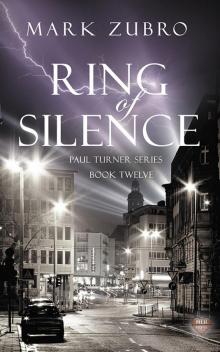 Ring of Silence
Ring of Silence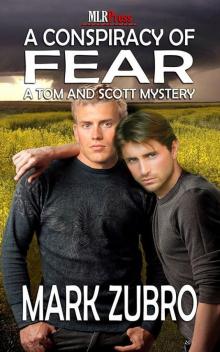 A Conspiracy of Fear
A Conspiracy of Fear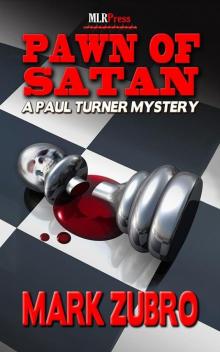 Pawn of Satan
Pawn of Satan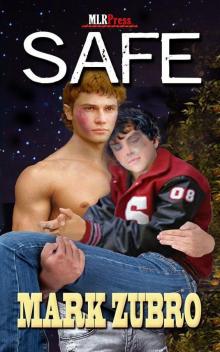 Safe
Safe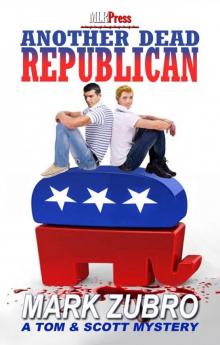 Another Dead Republican
Another Dead Republican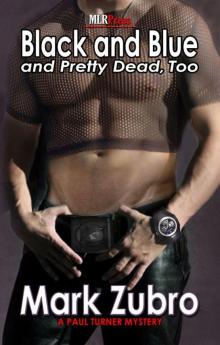 Black and Blue and Pretty Dead, Too
Black and Blue and Pretty Dead, Too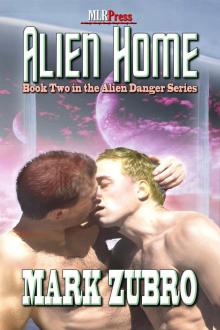 Alien Home
Alien Home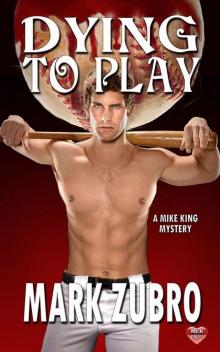 Dying to Play
Dying to Play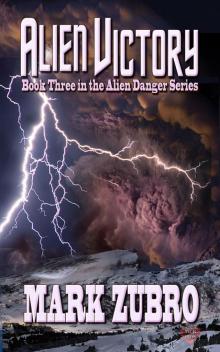 Alien Victory
Alien Victory